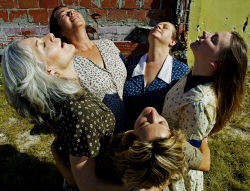The spirit of Anton Chekhov is omnipresent throughout today’s Wall Street Journal drama column, in which I review the Florida Repertory Theatre’s production of Brian Friel’s Dancing at Lughnasa, a play deeply influenced by the Russian master, and the Bridge Project’s inaugural staging of Tom Stoppard’s new English-language version of The Cherry Orchard. Here’s an excerpt.
* * *
Brian Friel, the greatest playwright of our time, is an Irishman whose works have the fingerprints of a Russian all over them. Anton Chekhov, Mr. Friel’s master, wrote plays in which plot takes a back seat to atmosphere and Russia itself is always the star of the show. As Mr. Friel has pointed out, Chekhov’s flesh-and-blood characters “behave as if their old certainties were as sustaining as ever–even though they know in their hearts that their society is in meltdown and the future has neither a welcome nor even an accommodation for them. Maybe a bit like people of my own generation in Ireland today.”
Might it be this transnational spirit that also makes Mr. Friel’s plays so accessible to American audiences and actors? Whatever the reason, the Florida Repertory Theatre, a company that could scarcely be further removed from Ballybeg, the imaginary Irish village where most of Mr. Friel’s plays are set, is putting on a production of “Dancing at Lughnasa” so sympathetic and comprehending that you can all but smell the peat burning in the onstage stove.
 A cross between “Three Sisters” and “The Glass Menagerie,” “Dancing at Lughnasa” is a semi-autobiographical memory play whose narrator (Chris Clavelli) tells what happened to his family during two summer days in 1936. Young Michael lives in a cottage with Chris (Rachel Burttram), his unmarried mother, and her four sisters, all of whom are barely making ends meet. The longings and frustrations of the Mundy sisters have grown too great to bear, and what was once a close-knit family is now–like Europe itself–on the verge of disintegration. The genius of “Dancing at Lughnasa” is that Mr. Friel has portrayed this sunset hour with the lightest of comic touches, letting the audience laugh as the black shadows that surround the Mundys grow imperceptibly longer.
A cross between “Three Sisters” and “The Glass Menagerie,” “Dancing at Lughnasa” is a semi-autobiographical memory play whose narrator (Chris Clavelli) tells what happened to his family during two summer days in 1936. Young Michael lives in a cottage with Chris (Rachel Burttram), his unmarried mother, and her four sisters, all of whom are barely making ends meet. The longings and frustrations of the Mundy sisters have grown too great to bear, and what was once a close-knit family is now–like Europe itself–on the verge of disintegration. The genius of “Dancing at Lughnasa” is that Mr. Friel has portrayed this sunset hour with the lightest of comic touches, letting the audience laugh as the black shadows that surround the Mundys grow imperceptibly longer.
Much of the quiet beauty of this production arises from the fact that it is performed by what amounts to a near-permanent ensemble of Florida-based actors. They fit together like an oft-assembled jigsaw puzzle…
Tom Stoppard, the second-greatest playwright of our time, is not at all like Chekhov but loves his plays and–even more to the point–has a consuming interest in Russian history. This doubtless explains why his new English-language version of “The Cherry Orchard” is a structurally faithful but verbally free adaptation in which Mr. Stoppard has turned Chekhov’s best-loved play into a pendant to “The Coast of Utopia,” his own trilogy of plays about the 19th-century writers who laid the groundwork for the Russian Revolution. Mr. Stoppard has discreetly sharpened the politics of “The Cherry Orchard,” making it less a lyrical meditation on unfulfilled lives and more a tough-minded portrait of Russia’s upper middle class on the eve of the arrival of modernity.
Mr. Stoppard’s “Cherry Orchard” is the inaugural offering of the Bridge Project, in which London’s Old Vic and New York’s BAM Harvey Theater are jointly producing a pair of classic plays (the other one, “The Winter’s Tale,” opens in February) directed by Sam Mendes and performed by a mixed cast of British and American actors that includes such familiar faces as Simon Russell Beale, Sinéad Cusack, Richard Easton and Ethan Hawke. Not surprisingly, the director of “American Beauty” and “Revolutionary Road” has taken the political ball and run with it in this staging, whose second half is full of expressionistic gestures that are all too clearly meant to let us know that revolution is just around the corner. The first half, on the other hand, is wholly faithful to the complex spirit of Chekhov–I can’t recall another production of “The Cherry Orchard” in which comedy and elegy were so well balanced…
* * *
Read the whole thing here.
